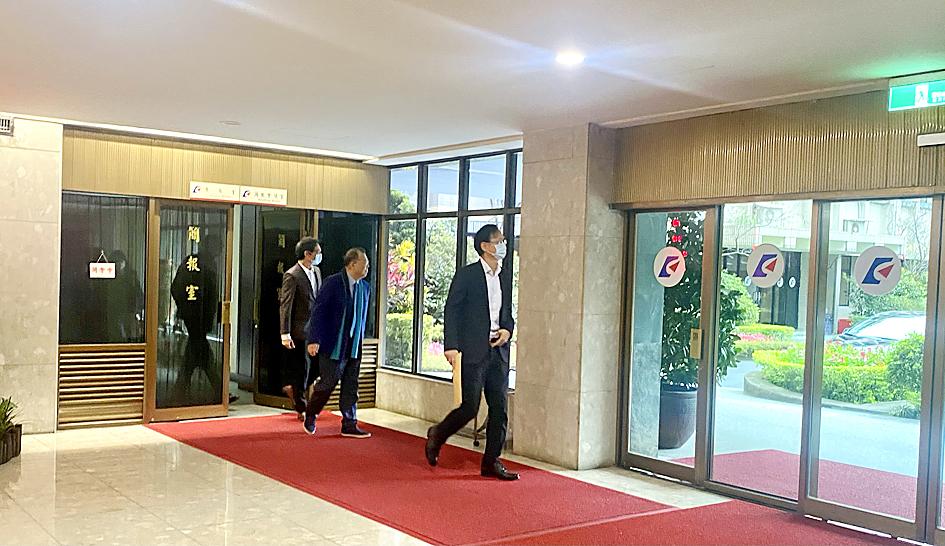As automakers around the world face work stoppages due to a lack of chips, Taiwan’s leading chipmakers will “do their best” to “squeeze out more chips” for the global auto industry, Minister of Economic Affairs Wang Mei-hua (王美花) said yesterday after a lunch meeting with company representatives.
Speaking after meeting with representatives of Taiwan Semiconductor Manufacturing Co (TSMC, 台積電), United Microelectronics Corp (UMC, 聯電), Vanguard International Semiconductor Corp (世界先進) and Powerchip Semiconductor Manufacturing Co (力積電), Wang said that chipmakers agreed to help “as much as they can,” but added that it would not be easy.
“Their production lines are already full or even overloaded right now, but [they understand that the] auto chip shortage is threatening the whole global auto supply chain,” Wang said. “Jobs are on the line.”

Photo: Huang Pei-chun, Taipei Times
Taiwanese chipmakers will try and optimize their production lines to go from “100 to 102 or 103 percent capacity,” and allocate the extra capacity for automakers, she said.
Chipmakers have also committed to giving auto chips the highest support rate, and to talk to their other customers to see if they are willing to accept a reduction or delay in orders, freeing up capacity for auto chips, she said.
Taiwanese chipmakers are part of the auto industry’s supply chain, manufacturing chips on a contract basis for auto chip designers, which sell them to auto components and vehicle manufacturers, Wang said.
Amid the COVID-19-induced global slowdown, customers slashed orders for auto chips, while demand for chips for information and communications technology and 5G applications soared, she said.
By the time auto demand came roaring back, Taiwanese foundries were already working at full capacity, she added.
“Chipmakers warned customers at the time that if they continued to cut auto chip orders, it would be hard to meet those orders when they return,” she said.
Wang confirmed that European, US and Japanese representatives went through diplomatic channels to ask for the ministry’s help on behalf of their automakers.
“Today was a good start, but this is going to be a longer-term problem,” Wang said, “It is all we can do right now to squeeze out some extra capacity as demand exceeds supply.”
“Our chipmakers are taking the impact [of the auto chip shortage] into account, but they have a duty to fulfill their existing contracts,” she said.
Nikkei Asia on Tuesday reported that Taiwanese chipmakers are mulling “another round of price increases, mainly in auto chips.”

UNCERTAINTY: Innolux activated a stringent supply chain management mechanism, as it did during the COVID-19 pandemic, to ensure optimal inventory levels for customers Flat-panel display makers AUO Corp (友達) and Innolux Corp (群創) yesterday said that about 12 to 20 percent of their display business is at risk of potential US tariffs and that they would relocate production or shipment destinations to mitigate the levies’ effects. US tariffs would have a direct impact of US$200 million on AUO’s revenue, company chairman Paul Peng (彭雙浪) told reporters on the sidelines of the Touch Taiwan trade show in Taipei yesterday. That would make up about 12 percent of the company’s overall revenue. To cope with the tariff uncertainty, AUO plans to allocate its production to manufacturing facilities in

Taiwan will prioritize the development of silicon photonics by taking advantage of its strength in the semiconductor industry to build another shield to protect the local economy, National Development Council (NDC) Minister Paul Liu (劉鏡清) said yesterday. Speaking at a meeting of the legislature’s Economics Committee, Liu said Taiwan already has the artificial intelligence (AI) industry as a shield, after the semiconductor industry, to safeguard the country, and is looking at new unique fields to build more economic shields. While Taiwan will further strengthen its existing shields, over the longer term, the country is determined to focus on such potential segments as

TAKING STOCK: A Taiwanese cookware firm in Vietnam urged customers to assess inventory or place orders early so shipments can reach the US while tariffs are paused Taiwanese businesses in Vietnam are exploring alternatives after the White House imposed a 46 percent import duty on Vietnamese goods, following US President Donald Trump’s announcement of “reciprocal” tariffs on the US’ trading partners. Lo Shih-liang (羅世良), chairman of Brico Industry Co (裕茂工業), a Taiwanese company that manufactures cast iron cookware and stove components in Vietnam, said that more than 40 percent of his business was tied to the US market, describing the constant US policy shifts as an emotional roller coaster. “I work during the day and stay up all night watching the news. I’ve been following US news until 3am

COLLABORATION: Given Taiwan’s key position in global supply chains, the US firm is discussing strategies with local partners and clients to deal with global uncertainties Advanced Micro Devices Inc (AMD) yesterday said it is meeting with local ecosystem partners, including Taiwan Semiconductor Manufacturing Co (TSMC, 台積電), to discuss strategies, including long-term manufacturing, to navigate uncertainties such as US tariffs, as Taiwan occupies an important position in global supply chains. AMD chief executive officer Lisa Su (蘇姿丰) told reporters that Taiwan is an important part of the chip designer’s ecosystem and she is discussing with partners and customers in Taiwan to forge strong collaborations on different areas during this critical period. AMD has just become the first artificial-intelligence (AI) server chip customer of TSMC to utilize its advanced